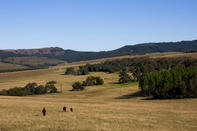Farming District
Before the town of Bedford was founded, the San and Bushmen tribes inhabited the area around 4 000 years ago. The land was completely untouched and wild animals like elephant, lion, leopard, hyena, wild dog and eland roamed the area freely.

By the mid-1700s, two migrant groups moved into the region, namely the Trekboers (Dutch settlers looking for new land) and groups of Xhosa (native people displaced by struggles within the tribe). In 1779, the Dutch negotiated with the Xhosa and reached an agreement on separating land, drawing a boundary along the Fish River to the Kaga Mountains overlooking Bedford and thence up to the Tarka River. Various clashes occurred between the two groups of people, including two wars that included the British and only ended in the 1800s.
When the British took control of the country, a number of European settlers streamed into South Africa with the promise of fertile lands and great prospects. In 1820, a group of British and Scottish settlers made their way to the area where Bedford would be founded, settling along the rivers and mountains of the region. War once again erupted between the Xhosa and the British, which ended in 1850.
In 1854, Bedford was proclaimed on a portion of the farm Maasström, property of Lieutenant Governor of the Cape, Sir Andries Stockenström. He named the town after his good friend, the Duke of Bedford from England. Today the town is surrounded by prominent farmlands, known mainly for cattle farming.